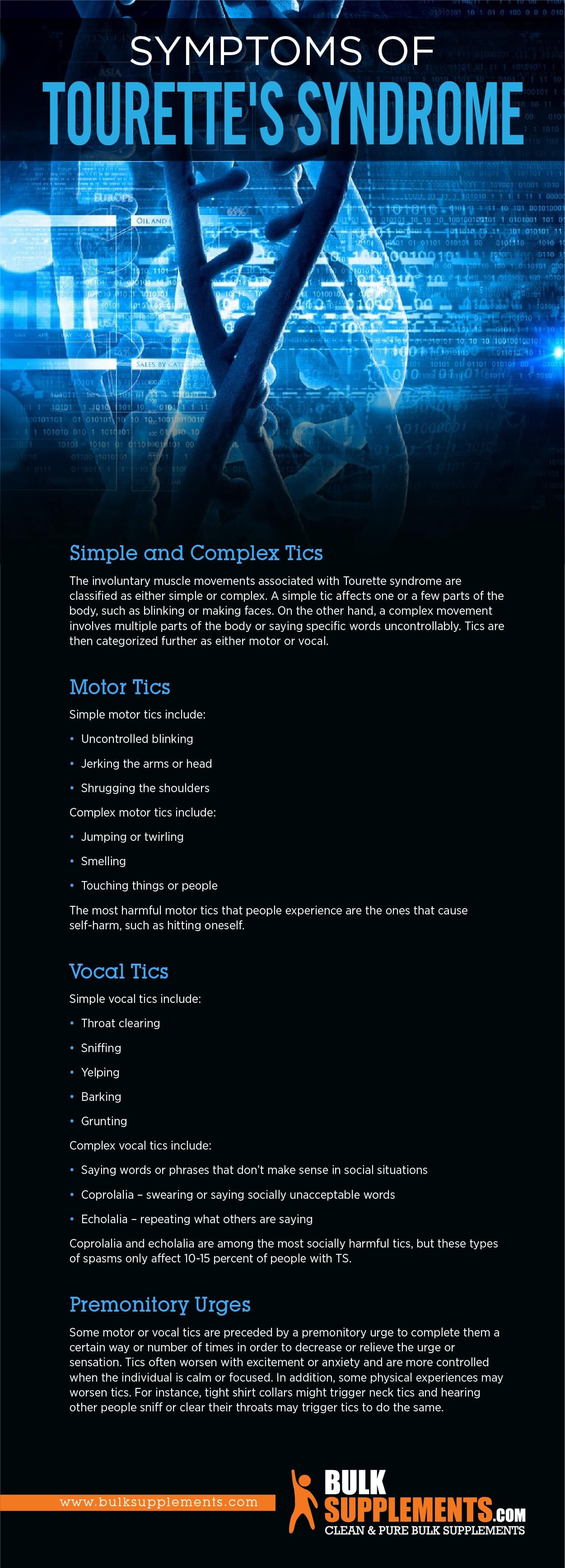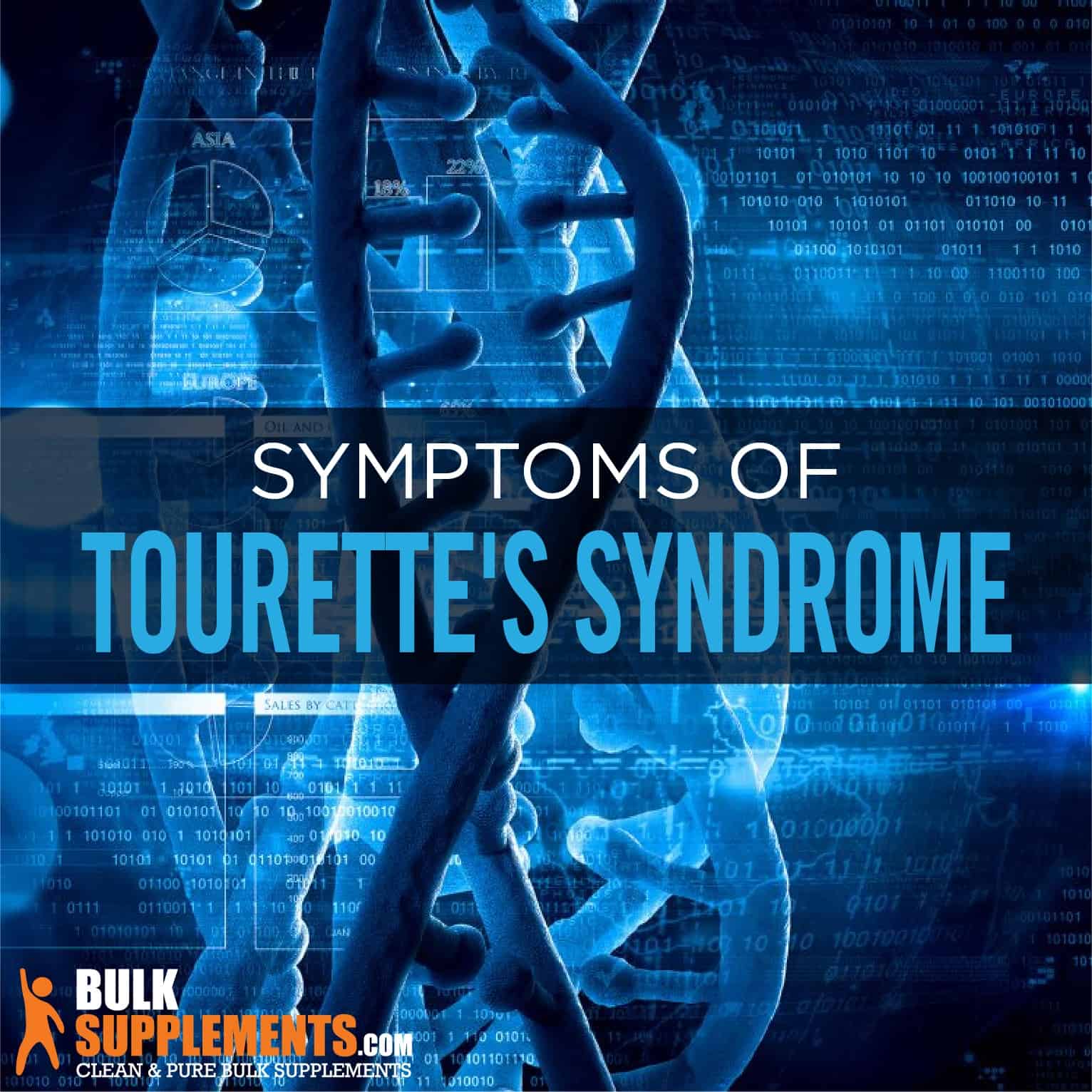What is Tourette’s Syndrome?
Tourette’s syndrome (TS) is a condition that causes uncontrolled muscle movements known as tics (x). For instance, individuals with this condition may blink or shrug their shoulders repeatedly without being able to control the movements. In other cases, patients with Tourette’s syndrome may blurt out words that they do not intend to say.
Although there are treatments to control them, many people do not require treatment unless the tics bother them. This condition often begins to manifest in childhood between the ages of 3 and 9 and usually affects males more often than females (x, x, x). The symptoms often improve with age or, for some people, disappear entirely (x).
Symptoms of Tourette’s Syndrome
The most apparent symptoms are the uncontrolled tics. Some are mild and barely noticeable, while others are more obvious. The spasms are triggered by stress, sickness, fatigue or excitement (x). However, some tics are so severe that they affect the social and professional lives of affected individuals.
Simple and Complex Tics
The involuntary muscle movements associated with Tourette’s syndrome are classified as either simple or complex (x, x). A simple tic affects one or a few parts of the body, such as blinking or making faces. On the other hand, a complex movement involves multiple parts of the body or saying specific words uncontrollably. Tics are then categorized further as either motor or vocal.
Motor Tics
Simple motor tics include (x):
- Uncontrolled blinking
- Jerking the arms or head
- Shrugging the shoulders
Complex motor tics include: (x)
- Jumping or twirling
- Smelling
- Touching things or people
The most harmful motor tics that people experience are the ones that cause self-harm, such as hitting oneself.
Vocal Tics
Simple vocal tics include (x):
- Throat clearing
- Sniffing
- Yelping
- Barking
- Grunting
Complex vocal tics include (x):
- Saying words or phrases that don’t make sense in social situations
- Coprolalia – swearing or saying socially unacceptable words
- Echolalia – repeating what others are saying
Coprolalia and echolalia are among the most socially harmful tics, but these types of spasms only affect 10-15 percent of people with TS (x).
Premonitory Urges
Some motor or vocal tics are preceded by a premonitory urge (x) to complete them a certain way or number of times in order to decrease or relieve the urge or sensation. Tics often worsen with excitement or anxiety and are more controlled when the individual is calm or focused (x). In addition, some physical experiences may worsen tics. For instance, tight shirt collars might trigger neck tics and hearing other people sniff or clear their throats may trigger tics to do the same.
Other Health Complications
Individuals might experience other health complications associated with TS including (x):

Course of Tourette’s Syndrome
Tics often vary with time in terms of type, location, frequency and intensity. They usually begin in the neck and head areas and progress to the torso and extremities (x). Generally, motor tics precede vocal tics and simple tics precede complex ones. The twitches usually become more severe during the mid-teens and begin to improve during early adulthood. Less than a quarter of people with TS experience tics that progress into adulthood (x).
Causes of Tourette’s Syndrome
Some studies link Tourette’s syndrome with an area of the brain called the basal ganglia (x, x), which controls muscle movements. Problems with nerve cells and chemicals in this area of the brain may cause the involuntary muscle movements associated with Tourette’s syndrome.
It is still unclear what causes problems in the basal ganglia, but some research suggests a genetic link. It is even possible that there is more than one cause of TS. People with a history of TS in their families are more likely to get the condition. However, individuals with TS in the same family may have different symptoms (x).
Diagnosis
Tourette’s syndrome requires clinical diagnosis. There is no blood test to make an official diagnosis. Before confirming the diagnosis, the neurologist will determine (x, x, x):
- How long the patient has had uncontrolled body movements — to be diagnosed with TS, the symptoms must occur for at least a year
- Whether the patient has both motor and vocal tics
- If the patient has had tics before he or she is 18
- Symptoms are not related to medicine or other medical conditions
In some cases, doctors may perform additional tests such as an MRI and CT scan to rule out other conditions with similar symptoms (x).
Treatment for Tourette’s Syndrome
Although the tics associated with TS are involuntary, some people manage to suppress, camouflage or manage their symptoms. Some TS therapies include (x):
Medication
Neuroleptics are a common type of drug to suppress tics, such as pimozide and haloperidol. Most TS symptoms do not cause impairment and therefore, most patients do not require medication unless the symptoms prevent them from functioning and other therapeutic options have been unsuccessful (x, x).
However, some of the other co-occuring conditions often require medications, such as ADD and ADHD (x). Unfortunately, no medication can eliminate TS symptoms altogether and sometimes they cause side effects like weight gain, tremors and sedation (x).
Deep Brain Stimulation
Deep brain stimulation alters brain circuitry using an implantable electrode and a programmable pulse generator to alter nerve activity. This method has mixed success, but some patients show positive results (x).
Comprehensive Behavioral Intervention for Tics (CBIT)
An alternative to medication, CBIT teaches TS patients to be aware of tics, how to manage the behavior when they feel the urge to tic and how to make changes to everyday behavior to reduce them (x).
Speech Therapy & Pathology
Trained counselors, psychologists, psychiatrists, social workers and occupational therapists perform speech therapy for tics using methods like CBIT. But speech pathologists can help patients manage other symptoms and co-occuring conditions that may interfere with social or academic functioning, such as learning disabilities, OCD, social language impairment, ADD and ADHD (x).
Supplements
Though they cannot treat Tourette’s symptoms, supplements are a great way to receive essential nutrients to keep your body and mind healthy when paired with other treatments.
Pure Inositol
An excellent source of vitamin B8, inositol promotes healthy skin and mental wellness. The suggested dietary intake for this supplement is 500 mg two or three times daily. Avoid inositol supplementation if you are expecting or nursing (x, x).
Pure Gamma-Aminobutyric Acid (GABA)
GABA promotes mental wellness, mood and sleep cycles. The suggested serving size is 750 mg twice per day before sleep and at least two hours before meals. This product is water-soluble, so you can mix it with juice, shakes or other fluids (x).
NAC N-Acetyl L-Cysteine Powder
NAC N-Acetyl L-Cysteine is an excellent antioxidant that supports liver functions, regulates blood glucose and improves digestion. The recommended dietary intake for NAC is 600 mg up three times a day.
Griffonia Seed Extract
This supplement (also known as 5-HTP) is a rich source of amino acids that helps with weight loss by reducing hunger. It also calms muscles and can help minimize muscle tics. The safe dosage for this supplement is between 50 and 200 mg per day with food. You are advised not to use this product if you are expecting, nursing or have Down syndrome (x).
Ashwagandha Extract
This supplement has natural anti-inflammatory and stress relief properties. Derived from the ashwagandha plant, this extract promotes cognitive health and provides relief from joint pains. The suggested safe serving size for ashwagandha extract is 450 mg up to three times per day (x).
Magnesium
This is a short-term laxative that also helps to relieve indigestion and heartburn. Magnesium supports heart, muscle and cognitive health. In addition, it has energy boosting properties that support athletic endurance. The suggested safe dosage for this supplement is 700 mg twice per day with lots of water (x).
Passion Flower
Passion flower is a powerful antioxidant that supports relaxation. In addition, it promotes overall mental and digestive health. The recommended intake amount is 1,000 mg daily with meals (x).
Chamomile
Chamomile is a great calming agent that may help minimize TS tics. It also supports digestion and healthy skin. The healthy serving size for chamomile is 800 mg once per day with lots of water (x).
The Bottom Line
Tourette’s syndrome causes uncontrolled muscle movements known as tics (x). Physicians have not identified the exact cause of this condition. The most apparent sign of TS is the uncontrolled motor or vocal tics. Most people with this condition do not require treatment unless the spasms affect their overall functioning (x).


